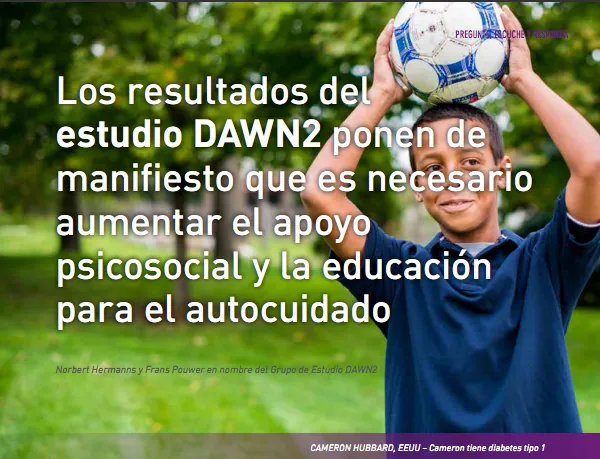13.9% of Spaniards with diabetes have a risk of depression, according to the results for our country of the “study of attitudes to diabetes, desires and needs 2” (Dawn2 in its acronym in English).This study is based on a survey conducted both people suffering from the disease and the main groups responsible for attending them: their relatives and health professionals.
Taking into account that, according to the latest estimates, in Spain there are around 5 million people with known diabetes-which makes this disease considerate of “epidemic”-, it would be 695,000 patients at risk of depression.Dawn 2's conclusions reveal that such a risk of depression derives, in turn, from the emotional stress that many of them suffer.
Specifically, 50% of respondents for the study feel stressed for their daily coexistence with diabetes, a disease that requires, as few, of self -control by patients.The situation also affects relatives, 45.5% of whom say they feel the same stress.
As Iñaki Lorente, psychologist of the Navarra Diabetes Association and a member of the Dawn2 experts in Spain, “when a person with diabetes or a relative of his perceive as a load he perceives as a load to have to control diabetes, tends to value worse its quality its qualityof life regarding the pre -diagnosis situation;Above all, when the level of stress is high and in cases where they believe that the evolution of the disease is not directly related to its self -care actions, but depend on variables outside their control. ”
This psychosocial impact of diabetes varies depending on its typology and treatment followed.Thus, 66.3% of patients with type 1 diabetes refer to high levels of depression associated with the disease, compared to 46.9% of those who suffer from type 2. Among the latter, 55.3%Of those who are treated with insulin, they have high levels of stress, something that only 35.5% of people who receive oral antidiabetics refer.
Among the causes of stress, is, above all, the impact of diabetes on the daily life of patients.One in five believes that the disease has a negative impact on their family relationships, a percentage equal to those who refer to the negative impact on their work or studies.
The greater the impact on leisure, negative for one in three, and in the economic situation, although in this case the percentages differ significantly between men and women: 25% of them believe that diabetes influences their finances in frontalmost 40% of female patients.
“Emotional stress or risk of depression derived from living with diabetes can negatively affect adherence to treatment, quality of life and disease control.Consequently, the attention to diabetes precise of an integral approach that contemplates both its medical and psychosocial aspects, ”says Mercedes Maderuelo, manager of the Federation of Spanish Diabetics and also a member of the Dawn2 expert panel.
Fear of hypoglycemia
The most common complications that people with diabetes usually face are hypoglycemia.They consist of the decrease in blood glucose levels that cause alterations in the body and that, in the most serious cases, can lead to a hypoglycemic coma.They occur when the reduction effect of glucose level that treatments with the consumption of sufficient carbohydrates or when it is done too much is not compensated.
64.7% of men with probing diabetes for DAWN2 recognize high levels of concern about the risk of hypoglycemia, compared to 76.6% ofwomen.Among relatives, regardless of sex, 76.4% of all of them say they are also concerned about the hypoglycemia that their relatives can suffer.Compared to the results of the study worldwide, Spanish respondents are, in fact, those who express a greater fear of these complications.
According to Marina Beléndez, professor of the Social Psychology area of the University of Alicante and member of the Dawn2 expert panel, “the concern for hypoglycemia, due to the possibility of future complications or discomfort when diabetes is out of control are aspects that aspects that aspects that aspects that aspects thatThey are problematic for a significant proportion of patients.Other sources of specific stress of this disease refer to the daily setbacks derived from treatment, such as concern regarding meals. ”
Dawn2 is a Novo Nordisk initiative conducted in collaboration with the International Diabetes Federation (IDF), the International Alliance of Patients ’Organizations (IAPO), the Steno Diabetes Center and other national, regional and world partners.It represents the opinions of more than 15,000 people suffering from the disease or taking care of people with diabetes in 17 countries on four continents.These countries are Mexico, the United States, Canada, France, Germany, Netherlands, Denmark, United Kingdom, Italy, Spain, Poland, Russia, Algeria, Turkey, India, China and Japan.
The results for Spain of the Dawn2 study, in which 909 people have participated (502 adults with type 1 and 2, 123 relatives and 284 health professionals), constitute the first scientific activity that reflects the experience and needs of people withDiabetes and their relatives in our country.More information at www.estudikown.es


